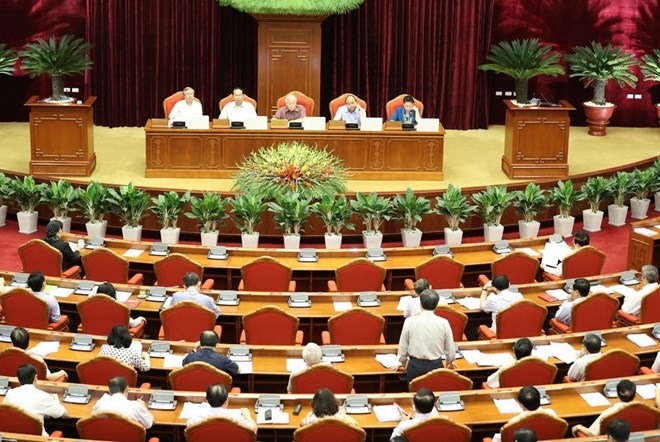 Politics & Law
Politics & Law

Members of the 12th-tenure Communist Party of Việt Nam Central Committee (CPVCC) yesterday agreed that there’s a need to reform the social security policy.
 |
| Members of the 12th-tenure Communist Party of Việt Nam Central Committee (CPVCC) yesterday agreed a need to reform the social security policy.— VNA/VNS Photo Trí Dũng |
HÀ NỘI — Members of the 12th-tenure Communist Party of Việt Nam Central Committee (CPVCC) yesterday agreed a need to reform the social security policy.
This is part of measures to fulfill the country’s determination of achieving universal social protection at their working session yesterday.
Discussing the master plan, they stressed that the insurance was considered as one of the main pillars of the system, contributing an important part to implementing progress and equality.
They agreed with the goals, tasks and solutions set by the plan.
Under the reform plan, the country aims to have 35 per cent of people in the labour age group participating in social insurance by 2021. The figure is expected to increase to 45 per cent by 2020 and 60 per cent by 2030.
Vice Chairman of the National Assembly Phùng Quốc Hiển said right now, only 13.9 million out of 53 million people in the labour age group have social security, adding that the coverage was at low level.
Minister of Labour, Invalids and Social Affairs Đào Ngọc Dung proposed issue policies to increase attractiveness of social security and increase support to help poor and disadvantaged people to join.
Regarding the plan to reduce the minimum compulsory time to pay for social security from 20 years to 10 years, many members said the reduction may cause imbalance between collection and spending.
They also proposed increase fines for those found not making contributions. Social insurance debt has been recorded in many localities and at different businesses, including both foreign and State-owned. Total social insurance debt was estimated at over VNĐ14 trillion (US$622 million) as of mid-2017.
Social security is paid monthly by employees and employers to cover costs in the event of retirement, maternity leave, bereavement, unemployment, or work-related health costs.
Minister Dung said adjusting retirement age was the general trend of the world and the adjustment depended on many factors. Việt
The current retirement age, 55 for women and 60 for men, was established in 1960 at the time when the average life expectancy was more than 40 years old. But now, the average life expectancy increased to 78 for females and 79.5 for males, the highest in the region while the average retirement age was lowest in the region.
Auditor General of the State Audit Office of Việt Nam Hồ Đức Phớc proposed retirement age at 62 for men and 58 for women.
They also proposed a study to decide different retirement age for people of different sectors, depending on the special characteristics of their jobs. — VNS